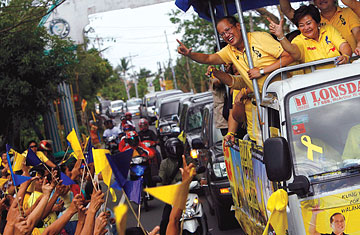
Aquino flashes the L sign first invoked by Cory during People Power in 1986
(2 of 3)
That, ultimately, has been more of a bane than a boon for the Philippines. From being the second richest country in Asia in the 1950s, it has dropped to among the continent's poorest and least dynamic. During the Marcos years, key industries were turned into monopolies run by friends and allies, creating a culture of crony capitalism that still lingers. While Arroyo is generally praised for guiding the economy to stability during the recession, much of the growth in the country is the result of remittances sent back by a legion of Filipinos encouraged to work abroad — currently an estimated 9 million to 11 million people, or roughly 10% of the country's total population. With little job creation at home, analysts point to the Philippines' inability to grow its middle class. "The basics for success are here, at least in terms of human capital," says Greg Rushford, a Washington-based expert on trade who has monitored the Philippines for over 30 years. "But there is a lack of seriousness in the political leadership — institutions are dominated by an uncaring wealthy class."
Aquino says he cares: he speaks eagerly and repeatedly about empowering the people by delivering them "freedom from hunger." His campaign has made curbing corruption its No. 1 goal; translated from Tagalog, its main slogan reads, "With No Corruption, There's No Poverty." Aquino says some $6 billion would return to the national budget each year were it not for graft in the system. But he and his nine rival candidates (who all, to varying degrees, have spoken out against corruption) are going up against a problem that is hardwired into the country's politics — one whose American-style democracy echoes the cutthroat days of Tammany Hall and whose hacienda culture of feudal oligarchs would seem familiar to much of Latin America. "There are ties of clan, family and region that are stronger than the nation," says Ramon Casiple, a leading political commentator in Manila. "To this day, it's all about patronage."
The rot in the Philippine system was perfectly illustrated last November, when gunmen in the service of the Ampatuans, a powerful ruling family in the Mindanao province of Maguindanao, ambushed the entourage of a rival politician, killing 57 people, including over two dozen journalists. The grisly massacre — some bodies were grotesquely mutilated and defiled — shocked the country and made global headlines. But while Arroyo has arrested leading Ampatuans and called for a ban on guns ahead of the polls, her opponents cite the clan's long-standing ties to her administration, which, they say, doled out generous state funding from Manila in exchange for support during local elections. "The incident dramatized the way feudal politics play out in the Philippines," says Marites Vitug, editor of Newsbreak, a respected Manila newsweekly.
What enraged many observers, beyond just the prevalence of naked warlordism in some of the poorer reaches of the country, was the audacity of the attack. It's a symptom, say Vitug and others, of a culture of impunity that has cemented itself in the Philippines over the decades and become exacerbated under the present government. A 2009 U.S. State Department report chronicled widespread extrajudicial killings and the disappearances of human-rights activists and leftist journalists, as well as the mistreatment of Muslims in the country's insurgency-ravaged south. It called corruption in the Philippines "endemic."
Rumors of politicians abusing their power swirl constantly in the voluble Philippine media, but little gets done to bring anyone to justice in a country whose courts are infamous for their low conviction rates. Arroyo became President in 2001 after being at the forefront of mass protests against perceived corruption in the administration of Joseph Estrada, a populist former movie star. In a rare instance of prosecution, Estrada was convicted of "plunder" in 2007, only to be pardoned by Arroyo months later. He's now among the front-runners in this May's presidential polls.
Like Mother, Like Son
Aquino is not the only candidate promising social renewal, but he seems well suited for the part — carrying himself with an air of almost Gandhian simplicity and uprightness. Ahead of his decision to run, he consulted in seclusion with the nuns of a Carmelite convent. He later exasperated aides by sending back shoes purchased for the campaign trail because they were too expensive. Unmarried, he leans on his four sisters for support. "Someone had to tell him that a shirt has to fit in a certain way," sighs Kris. "That his jeans can't have pleats."
But this modesty has not won over all. Aquino's chief rival in the elections, Manuel Villar, is a suave, smiling businessman with a rags-to-riches story, rising from a Manila slum to become one of the wealthiest and most powerful men in the country. He scoffs at Aquino's thin political record: "Has he done anything?" Villar himself has held influential seats in the Philippine Congress for over a decade and some accuse of him of using his political clout to grow his own real estate fortune, a charge Villar dismisses. His campaign spending has dwarfed that of other candidates, funding lavish TV ads and radio jingles, and he's associated with a roster of big-ticket allies, including world-champion boxer Manny Pacquiao. "I am not a movie star. My parents weren't heroes," Villar tells TIME. "The playing field needs to be leveled somehow."
